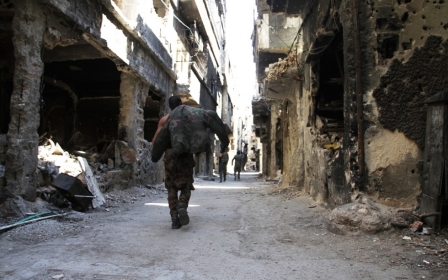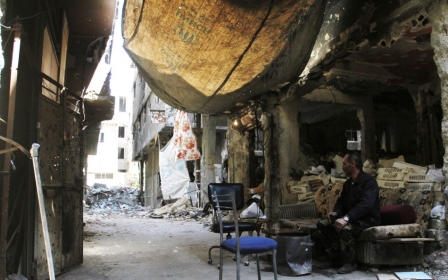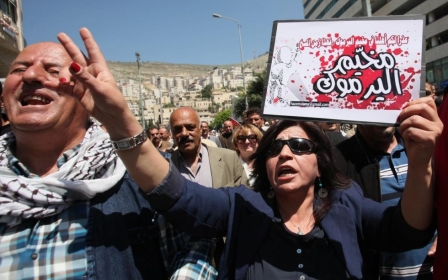Syria's Assad offers to fight IS in Yarmouk after two year siege

The government of Syrian President Bashar al-Assad said on Tuesday that it is ready to offer Palestinians firepower to support their battle with the Islamic State (IS) group in a refugee camp devastated by clashes and aerial attacks.
The deteriorating humanitarian situation in the Yarmouk camp has pushed the UN Security Council to demand greater access to residents trapped between the encroaching IS militants and besieging government forces.
The fierce clashes that began on 1 April have ceased, but regime forces continue to drop barrel bombs on the camp, which lies six kilometres (3.5 miles) from central Damascus.
In the capital, Deputy Foreign Minister Faisal Meqdad met with a delegation from the Palestine Liberation Organisation (PLO) headed by Ahmad Majdalani.
"Syrian authorities are ready to support the Palestinian fighters in a number of ways, including militarily, to push IS out of the camp," said PLO official Anwar Abdul Hadi, who was at the meetings.
The "Syrian government had used all its efforts to present humanitarian and medical aid to Palestinian refugees and ... it had helped them exit Yarmouk safely," Meqdad said.
"Syria and the PLO are determined to fight terrorism, which has reached Palestinian camps in Syria, notably Yarmouk," he said, quoted by the official SANA news agency.
Speaking after meeting with Meqdad, Majdalani told AFP they had "agreed on the need for a unified position for the Palestinian forces in Syria, in coordination with the Syrian government."
He said there would be continued cooperation between Syrian and Palestinian leaders "to defeat terrorism in Yarmouk".
A meeting among Syria's Palestinian factions is set to take place on Wednesday to discuss a broader consensus.
If achieved, this rapprochement would be significant for Yarmouk, which had seen fierce clashes since the end of 2012 between government forces and rebels supported by Palestinian groups.
Most of the Palestinian factions in Yarmouk are opposed to President Bashar al-Assad, but IS's arrival there sounded alarm bells in Damascus as it is the closest IS has ever been to the capital.
'Worse than a big prison'
Camp residents have described a disastrous humanitarian situation.
"I used to call the camp a big prison... Now, it's different, it's even worse," Samer told AFP via Skype from inside the camp.
"There was a young man who was killed next to my house by barrel bombs. We picked him up in pieces."
Most of the camp's doctors had already fled, leaving only paramedics to care for the wounded.
A sniper shot dead a 12-year-old girl on Tuesday at the edge of Yarmouk, another resident said, describing her as a child who "loved singing, music and playing the drums".
On Monday, the Security Council called "for the protection of civilians in the camp for ensuring humanitarian access to the area," said Jordan's ambassador Dina Kawar, the council chair this month.
In a meeting with the council, Pierre Krahenbuhl, who heads the UN agency for Palestinian refugees, UNRWA, described the situation as "more desperate than ever" for the camp's roughly 18,000 remaining residents.
"What civilians in Yarmouk are most concerned about right now is bare survival," he said.
Since 2012, Yarmouk has been under a nearly impenetrable siege by forces loyal to President Bashar al-Assad that has left about 200 people dead due to malnutrition and lack of medication, said the Syrian Observatory for Human Rights.
The Syrian National Coalition (SNC) on Tuesday held Assad’s government responsible for the “humanitarian disaster” afflicting Yarmouk.
“The Assad regime’s two-year siege of Yarmouk has inflicted an ongoing humanitarian disaster on Yarmouk,” the SNC’s Mouaffaq Nyrabia said in a statement.
“ISIL’s infiltration of the camp is another awful consequence of the chaos Assad has created. The citizens of Yarmouk, Syrians and Palestinians alike, are stuck between the regime’s aerial bombardment and the barbarity of ISIL militants on the ground, intensifying the already desperate humanitarian crisis and preventing humanitarian assistance reaching the camp,” he said, using an alternative acronym for IS.
The SNC praised the European Union for announcing €2.5mn in emergency funding for UNRWA – the UN agency for Palestinian refugees – to aid in supporting Yarmouk.
IS began an assault on Yarmouk last Wednesday and was initially repelled by Palestinian fighters but has since seized large swathes of the district.
At least 39 people, among them eight civilians, have been killed in the fighting, the Observatory said.
The Britain-based monitor said IS forces were present in the south, west and east of the camp, with Palestinian fighters largely confined to the north.
The IS attack is just the latest blow for Yarmouk, which was once a thriving, working-class residential district of the capital, home to some 160,000 people, Syrians and Palestinians.
In violence elsewhere on Tuesday, two car bombs and heavy clashes erupted in Marea, a strategic city in northern Syria controlled by militant groups including Al-Qaeda affiliate Al-Nusra Front, as IS militants sought to expand their reach.
Fifteen people were killed in the twin car bombs but there was no immediate information on the casualties from the fighting, said Rami Abdel Rahman, head of the Britain-based Syrian Observatory for Human Rights.
New MEE newsletter: Jerusalem Dispatch
Sign up to get the latest insights and analysis on Israel-Palestine, alongside Turkey Unpacked and other MEE newsletters
Middle East Eye delivers independent and unrivalled coverage and analysis of the Middle East, North Africa and beyond. To learn more about republishing this content and the associated fees, please fill out this form. More about MEE can be found here.




